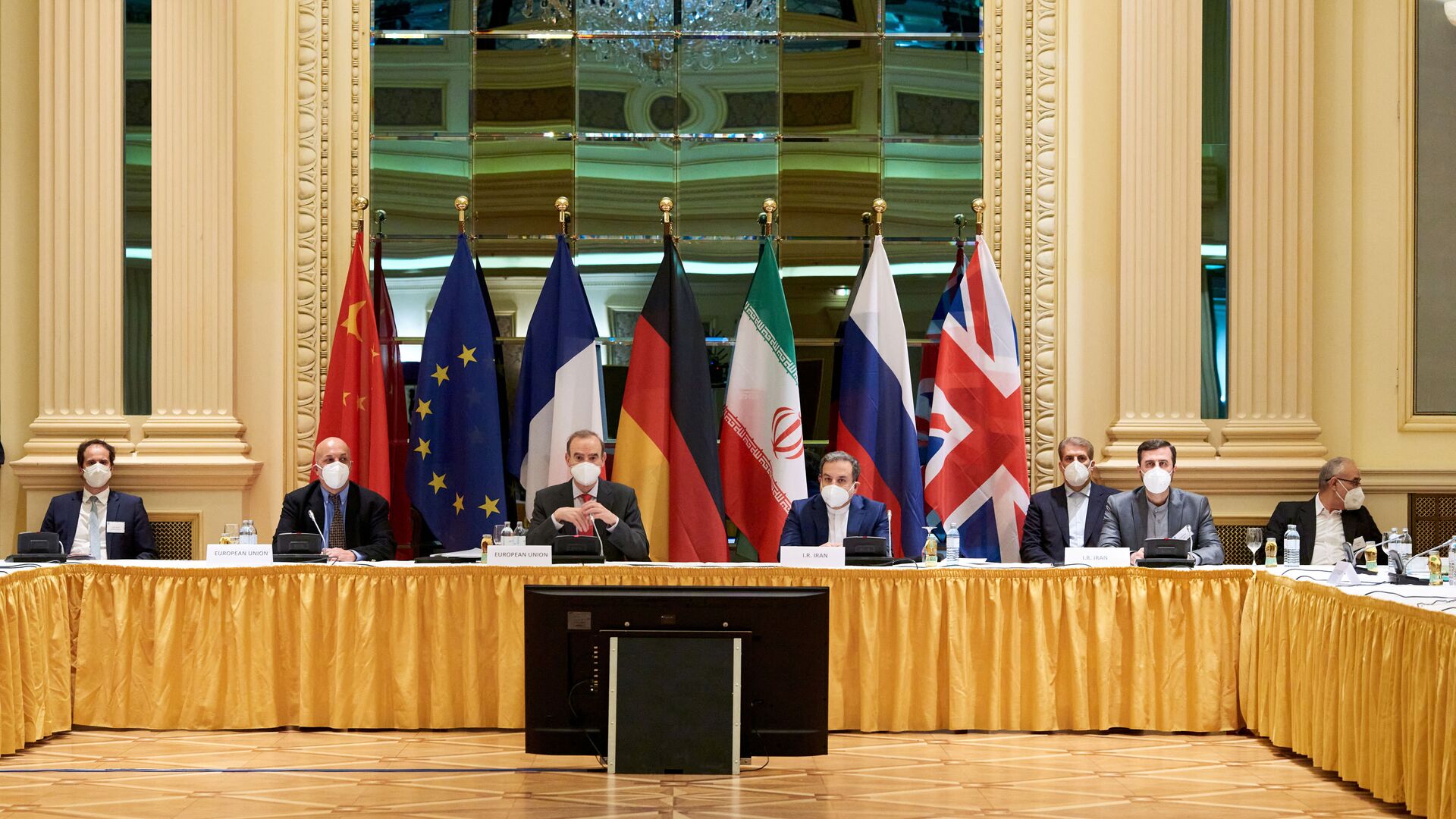https://sputnikglobe.com/20220313/us-ready-to-sacrifice-iranian-nuclear-deal-to-keep-anti-russian-sanctions-in-place-report-says-1093828765.html
US Ready to Sacrifice Iranian Nuclear Deal to Keep Anti-Russian Sanctions in Place, Report Says
US Ready to Sacrifice Iranian Nuclear Deal to Keep Anti-Russian Sanctions in Place, Report Says
Sputnik International
After imposing harsh sanctions on Russia over its military operation in Ukraine, the United States said that the restrictions are not connected to the Iran... 13.03.2022, Sputnik International
2022-03-13T12:22+0000
2022-03-13T12:22+0000
2022-03-13T12:22+0000
us
jcpoa
iran
nuclear deal
https://cdn1.img.sputnikglobe.com/img/07e5/04/08/1082567689_0:99:3291:1950_1920x0_80_0_0_9a06d7d5b68ce1bf21d040185dae8b29.jpg
Washington will not negotiate any exemptions from the Ukraine-related sanctions for Russia in order to save the Iranian nuclear deal, The Wall Street Journal has reported, citing a senior State Department official.According to the report, in the event of Russia not giving up its demands regarding the deal, the US would try to strike an alternative agreement that would not include Moscow.The official told The Wall Street Journal that if Russia continues to demand guarantees or does not reply "in the coming week", Washington would need to "very quickly consider an alternative path".Now that Washington is reportedly eyeing the possibility of striking an alternative deal without Russia, it is unknown whether Iran would opt for such an accord. Per The Wall Street Journal, European officials on Friday indicated their readiness for an alternative agreement without Moscow.When the JCPOA was inked in 2015, it envisaged Iran significantly scaling back its nuclear programme in exchange for sanctions relief. The signatories were Iran, China, France, Russia, the United Kingdom, Germany, the European Union, and the United States - but in 2018, former US President Donald Trump unilaterally withdrew Washington from the deal and reinstated sanctions against Iran. The move prompted Tehran to breach the nuclear limits imposed by the JCPOA.Restoring the nuclear deal was one of current US President Joe Biden's main foreign policy goals. Since April 2021, negotiations to revive the accord have been ongoing in Vienna, with their seventh round wrapping up in December. The talks restarted in February 2022. On 5 March, Russia rolled out a demand that its trade with Iran would not be affected by the slew of sanctions imposed on Moscow over its military operation in Ukraine. The demand prompted condemnation from other nuclear deal signatories, particularly the so-called E3 - Germany, the UK, and France. The group said that "nobody should seek to exploit JCPOA negotiations to obtain assurances that are separate to the JCPOA", warning that Russian demands for guarantees could risk the collapse of the nuclear deal.The US Department of State asserted that the Ukraine-related sanctions are separate from the JCPOA and should not impact the Vienna talks.Let's stay in touch no matter what! Follow our Telegram channel to get all the latest news: https://t.me/sputniknewsus
iran
Sputnik International
feedback@sputniknews.com
+74956456601
MIA „Rossiya Segodnya“
2022
Sputnik International
feedback@sputniknews.com
+74956456601
MIA „Rossiya Segodnya“
News
en_EN
Sputnik International
feedback@sputniknews.com
+74956456601
MIA „Rossiya Segodnya“
Sputnik International
feedback@sputniknews.com
+74956456601
MIA „Rossiya Segodnya“
us, jcpoa, iran, nuclear deal
us, jcpoa, iran, nuclear deal
US Ready to Sacrifice Iranian Nuclear Deal to Keep Anti-Russian Sanctions in Place, Report Says
After imposing harsh sanctions on Russia over its military operation in Ukraine, the United States said that the restrictions are not connected to the Iran nuclear deal and should not impact the talks in Vienna.
Washington will not negotiate any exemptions from the Ukraine-related sanctions for Russia in order to save the Iranian nuclear deal,
The Wall Street Journal has
reported, citing a senior State Department official.
According to the report, in the event of Russia not giving up its demands regarding the deal, the US would try to strike an alternative agreement that would not include Moscow.
The official told The Wall Street Journal that if Russia continues to demand guarantees or does not reply "in the coming week", Washington would need to "very quickly consider an alternative path".
"I don't see the scope for going beyond what is within the confines of the JCPOA", the official said. "I think it's pretty safe to say that there is no room for making exemptions beyond those".
Now that Washington is reportedly eyeing the possibility of striking an alternative deal without Russia, it is unknown whether Iran would opt for such an accord. Per The Wall Street Journal, European officials on Friday indicated their readiness for an alternative agreement without Moscow.
When the JCPOA was inked in 2015, it envisaged Iran significantly scaling back its nuclear programme in exchange for sanctions relief. The signatories were Iran, China, France, Russia, the United Kingdom, Germany, the European Union, and the United States - but in 2018, former US President Donald Trump unilaterally withdrew Washington from the deal and reinstated sanctions against Iran. The move prompted Tehran to breach the nuclear limits imposed by the JCPOA.
Restoring the nuclear deal was one of current US President Joe Biden's main foreign policy goals. Since April 2021, negotiations to revive the accord have been ongoing in Vienna, with their seventh round wrapping up in December.
The talks restarted in February 2022. On 5 March, Russia rolled out a demand that its trade with Iran would not be affected by the slew of sanctions imposed on Moscow over its military operation in Ukraine. The demand prompted condemnation from other nuclear deal signatories, particularly the so-called E3 - Germany, the UK, and France. The group said that "nobody should seek to exploit JCPOA negotiations to obtain assurances that are separate to the JCPOA", warning that Russian demands for guarantees could risk the collapse of the nuclear deal.
The US Department of State asserted that the Ukraine-related sanctions are separate from the JCPOA and should not impact the Vienna talks.
Let's stay in touch no matter what! Follow our Telegram channel to get all the latest news: https://t.me/sputniknewsus 
